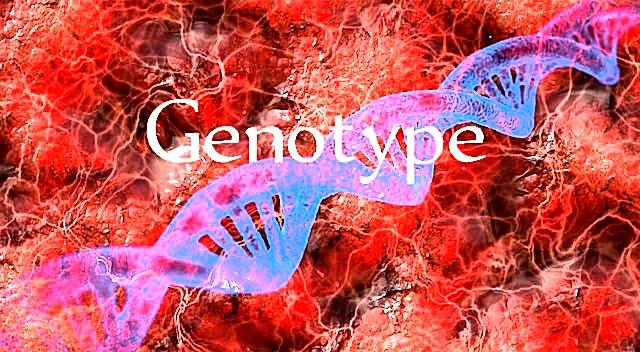Definition of Genotype and Genetic Testing:
Genotype refers to an individual's complete set of genetic information, including variations and mutations, which is contained in the DNA of each person's cells. Genetic testing involves analyzing a person's DNA to identify specific genetic variations or mutations that may indicate an increased risk for certain health conditions.
Overview of the Importance of Genotype Testing
Genotype testing plays an increasingly important role in the field of medicine and healthcare. It offers valuable information about an individual's unique genetic makeup and potential health risks, enabling personalized and proactive approaches to disease prevention and management. Understanding the significance and benefits of genotype testing is essential for informed decision-making and improved health outcomes.
Understanding Your Risk for Certain Conditions
How Genotype Testing Can Help Identify Potential Health Risks:
Genotype testing can provide insight into an individual's genetic predisposition for certain health conditions. By identifying specific genetic variations or mutations, genotype testing can help determine an individual's risk for conditions such as heart disease, cancer, and other inherited disorders. This information can be crucial for early detection and prevention, allowing individuals to take proactive steps to maintain their health and reduce their risk of developing these conditions.
Early Detection and Prevention of Conditions through Genotype Testing:
Genotype testing can aid in early detection of health conditions by identifying genetic markers that may indicate an increased risk. This information can help individuals make lifestyle changes, undergo regular screenings, or receive prophylactic treatments to reduce their risk of developing the condition. Early detection and prevention can improve health outcomes and reduce the likelihood of developing serious and potentially life-threatening conditions.
Example: Genetic Testing for Conditions such as Cancer and Heart Disease:
For example, genetic testing can help identify individuals who may have an increased risk for certain types of cancer, such as breast, ovarian, or colon cancer, based on specific genetic mutations. Similarly, genetic testing can help identify individuals with a family history of heart disease who may have an inherited risk for the condition. This information can aid in early detection and prevention, and help individuals take proactive steps to maintain their health.
Personalized Medicine
The Role of Genotype Testing in Creating Tailored Treatment Plans:
Genotype testing can play a key role in personalized medicine by providing information about an individual's unique genetic makeup and potential health risks. This information can inform treatment decisions and help healthcare providers create tailored treatment plans that are specifically designed for each individual patient. By taking into account an individual's genetic makeup, genotype testing can help ensure that treatment plans are effective and minimize the risk of adverse reactions or ineffective treatments. This approach can improve health outcomes and lead to better treatment results.
Benefits of Personalized Medicine and How Genotype Testing Helps to Achieve it:
Personalized medicine offers numerous benefits, including more effective and efficient treatment, reduced risk of adverse reactions, and improved health outcomes. By providing valuable information about an individual's unique genetic makeup, genotype testing can help healthcare providers create tailored treatment plans that are specifically designed to meet each patient's needs.
Genotype testing can also help identify individuals who may have a heightened risk for certain health conditions, allowing for early detection and prevention. This information can inform treatment decisions and help healthcare providers determine the most effective and appropriate treatments for each individual patient.
In summary, genotype testing plays a critical role in the advancement of personalized medicine by providing valuable information about an individual's genetic makeup and potential health risks, enabling healthcare providers to create tailored treatment plans that improve health outcomes and lead to better treatment results.
Example: Genotype Testing in Combination with Other Health Information to Optimize Treatment:
An example of how genotype testing can be used in combination with other health information to optimize treatment can be seen in the field of cancer. Genotype testing can help identify specific genetic mutations that may indicate an increased risk for certain types of cancer. This information, combined with other health information such as age, lifestyle, and medical history, can inform treatment decisions and help healthcare providers determine the most effective and appropriate treatments for each individual patient.
For instance, in the case of breast cancer, genotype testing can identify specific mutations in the BRCA1 or BRCA2 genes, which may indicate an increased risk for the disease. This information, combined with other factors such as family history and personal risk factors, can help healthcare providers develop a personalized treatment plan that includes increased surveillance, prophylactic treatments, and lifestyle modifications to reduce the risk of developing the condition.
In conclusion, by combining genotype testing with other health information, healthcare providers can create personalized treatment plans that are specifically designed to meet each patient's needs and optimize health outcomes.
Improving Outcomes with Genotype Testing
How Genotype Testing Can Inform Treatment Decisions and Improve Outcomes:
Genotype testing can provide valuable information about an individual's unique genetic makeup and potential health risks, allowing healthcare providers to make informed treatment decisions. By taking into account an individual's specific genetic information, treatment plans can be tailored to meet each patient's needs and optimize health outcomes.
For instance, genotype testing can help identify specific genetic mutations that may indicate an increased risk for certain health conditions, such as cancer or heart disease. This information can inform treatment decisions and help healthcare providers determine the most effective and appropriate treatments for each individual patient, reducing the risk of adverse reactions and improving health outcomes.
In addition, by providing information about an individual's specific genetic mutations, genotype testing can help healthcare providers select the most appropriate medications, dosages, and treatment regimens, reducing the risk of ineffective treatments and improving health outcomes.
Overall, genotype testing plays a critical role in improving health outcomes by providing valuable information that informs treatment decisions and enables healthcare providers to create personalized treatment plans that are specifically designed to meet each patient's unique needs.
Importance of Genotype Testing in Drug Therapy:
Genotype testing can play a critical role in drug therapy by providing information about an individual's specific genetic mutations and potential health risks. This information can inform treatment decisions and help healthcare providers determine the most effective and appropriate medications, dosages, and treatment regimens.
For example, genotype testing can identify specific genetic mutations that may affect the way a person metabolizes certain medications. This information can help healthcare providers determine the most appropriate dosage and avoid potential adverse reactions that may occur as a result of an incorrect dosage.
In addition, genotype testing can help identify individuals who may have a heightened risk for certain health conditions, such as cardiovascular disease or certain types of cancer. This information can inform treatment decisions and help healthcare providers determine the most appropriate medications and dosages to minimize the risk of adverse reactions and improve health outcomes.
Overall, genotype testing is an important tool in drug therapy, providing valuable information that informs treatment decisions and enables healthcare providers to create personalized treatment plans that optimize health outcomes and minimize the risk of adverse reactions.
Example: Personalized Dosing Based on Genotype for Better Efficacy and Safety:
An example of how genotype testing can inform personalized dosing for better efficacy and safety is seen in the field of psychiatry. Many psychiatric medications, such as antidepressants, are metabolized differently by different individuals, depending on their genetic makeup.
Genotype testing can help identify specific genetic mutations that may affect the way a person metabolizes certain medications. This information can inform treatment decisions and help healthcare providers determine the most appropriate dosage, reducing the risk of adverse reactions and improving the efficacy of the medication.
For example, genotype testing can identify individuals who may have a specific genetic mutation that results in a slower metabolism of a certain antidepressant medication. In this case, a higher dosage may be required to achieve the desired therapeutic effect, while avoiding potential adverse reactions that may occur as a result of an incorrect dosage.
In conclusion, by using genotype testing to inform personalized dosing, healthcare providers can ensure that medications are being used at the most appropriate and effective dosages, reducing the risk of adverse reactions and improving health outcomes.
The Future of Healthcare
Advancements in Genotype Testing and Its Impact on Healthcare:
Genotype testing is a rapidly evolving field that has the potential to transform the way healthcare is delivered and improve health outcomes for individuals around the world. With advancements in technology and increasing access to genetic information, genotype testing is becoming increasingly accessible and affordable, making it possible for more individuals to take advantage of its benefits.
One of the key advancements in genotype testing is the increasing availability of direct-to-consumer (DTC) genetic testing. DTC genetic testing enables individuals to access their own genetic information without the need for a healthcare provider, making it easier and more convenient for individuals to learn about their genetic makeup and potential health risks.
Another important advancement in genotype testing is the increasing accuracy and precision of genetic tests. With improvements in technology, genetic tests are becoming more sensitive and are able to detect even small genetic mutations that may have significant implications for health.
Finally, the integration of genotype testing into electronic health records (EHRs) is another important development that has the potential to transform healthcare. By incorporating genetic information into EHRs, healthcare providers can access a patient's complete health information, including their genetic information, and make more informed treatment decisions.
In conclusion, advancements in genotype testing are poised to have a significant impact on healthcare, enabling individuals to learn about their genetic makeup, improving health outcomes through personalized medicine, and transforming the way healthcare is delivered.
The Potential of Genotype Testing in Disease Prevention and Management:
The potential of genotype testing in disease prevention and management is vast and far-reaching. By identifying individuals who may be at an increased risk for certain conditions, genotype testing can facilitate earlier detection and intervention, reducing the risk of developing a full-blown condition and improving health outcomes.
Additionally, by identifying genetic mutations that may impact the way a person metabolizes medication, genotype testing can inform personalized dosing, reducing the risk of adverse reactions and improving the efficacy of medication.
In the future, genotype testing has the potential to play an even greater role in disease prevention and management by enabling healthcare providers to develop targeted screening and intervention programs for individuals with specific genetic profiles.
For example, genotype testing could be used to identify individuals who are at a high risk for developing a specific type of cancer and target them for screening and early intervention. This could significantly improve health outcomes and reduce the overall burden of disease.
In conclusion, the potential of genotype testing in disease prevention and management is substantial and has the potential to transform healthcare. By using genotype testing to identify individuals who are at an increased risk for certain conditions, healthcare providers can facilitate earlier detection, inform personalized treatment decisions, and ultimately improve health outcomes.
Importance of Genotype Testing in the Context of the Current Healthcare Landscape:
Genotype testing has become increasingly important in the context of the current healthcare landscape for several reasons. Firstly, with an aging population and increasing rates of chronic disease, healthcare providers are facing growing demands for effective and personalized treatments. Genotype testing can help address these demands by enabling healthcare providers to make more informed treatment decisions based on a patient's genetic information.
Secondly, genotype testing can help improve access to care by enabling healthcare providers to identify individuals who are at an increased risk for certain conditions, leading to earlier detection and intervention. This can help reduce the burden of disease and improve health outcomes, especially for individuals who are unable to access regular healthcare.
Finally, genotype testing is becoming increasingly accessible and affordable, making it possible for more individuals to take advantage of its benefits. With the availability of direct-to-consumer (DTC) genetic testing, individuals can now access their own genetic information without the need for a healthcare provider, providing greater access to genetic information and empowering individuals to take control of their own health.
In conclusion, genotype testing has become increasingly important in the context of the current healthcare landscape. With growing demands for effective and personalized treatments, the need for early detection and intervention, and increasing access to genetic information, genotype testing has the potential to play a critical role in improving health outcomes and transforming healthcare.
Conclusion:
In conclusion, genotype testing offers a wealth of benefits for individuals who are seeking to improve their health outcomes. By providing insight into an individual's genetic makeup, genotype testing can help identify potential health risks, inform personalized treatment plans, and improve outcomes through personalized dosing.
The potential of genotype testing in disease prevention and management is substantial, and its importance in the context of the current healthcare landscape cannot be overstated. With growing demands for effective and personalized treatments, the need for early detection and intervention, and increasing access to genetic information, genotype testing has the potential to play a critical role in improving health outcomes and transforming healthcare.
For individuals who are seeking to improve their health outcomes, knowing your genotype is a powerful tool. By considering genotype testing, individuals can gain valuable insights into their genetic information, empowering them to take control of their health and improve their well-being.
So, if you're interested in improving your health outcomes, consider genotype testing. With its many benefits and the growing availability of direct-to-consumer genetic testing, there's never been a better time to learn more about your genetic makeup and take control of your health.
20 Important Facts About Genotype
- The genotype is the complete set of an organism's genetic information.
- It is encoded in DNA and determines the physical and behavioral traits of an individual.
- The genotype is determined by the combination of genes inherited from the parents.
- Some traits are dominant and some are recessive, based on the presence of specific alleles.
- The expression of the genotype is influenced by environmental factors.
- The study of genotype is a branch of biology called genetics.
- Mutations in the genotype can result in genetic disorders or variations.
- The Human Genome Project aimed to sequence and map all human genes.
- The study of genotype and phenotype interactions is known as epigenetics.
- A genome is the complete set of genetic information for an organism.
- The human genome has approximately 20,000-25,000 protein-coding genes.
- Genotype can be used in medical diagnosis and personalized treatment.
- Inbreeding can increase the expression of recessive traits and decrease genetic diversity.
- The Hardy-Weinberg equilibrium describes the frequency of alleles in a population over time.
- The study of the distribution and evolution of genotypes is called population genetics.
- The genotype can affect a person's susceptibility to certain diseases.
- The Human Leukocyte Antigen (HLA) system is used in tissue matching for transplants.
- Advances in genetic engineering and biotechnology have made it possible to manipulate genotypes.
- Direct-to-consumer genetic testing companies offer insight into an individual's ancestry and health risks.
- The ethical and social implications of genotype information are still being debated.



